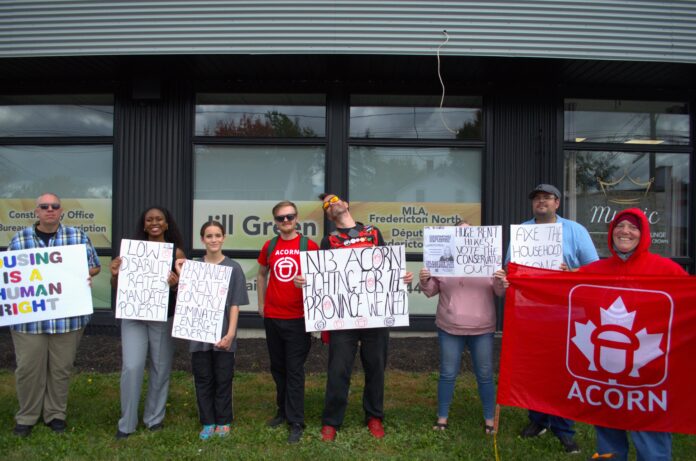
On Sept. 27, people gathered in Moncton and Fredericton for NB ACORN’s Raise the Rates rally — an attempt to raise awareness for the lack of support given to people with disabilities in New Brunswick.
Ralliers consisted of concerned citizens and members of NB ACORN (Association of Community Organizations for Reform Now), a group that fights for the rights of low-income people across the province. In Fredericton, the rally gathered in front of Jill Green’s office and cars honked in support as they passed.
“They’re already struggling with whatever disability they have. Then on top of that, they’ve got to struggle to live a normal existence,” said Nichola Taylor, chair of NB ACORN. “It’s not right and it’s not fair.”
The main issue the rally addressed was the current disability support payments, which Taylor said are keeping people with disabilities below the poverty line.
In N.B., the disability support payment amount sits at $918 per month, which equates to only $11,016 annually. According to Statistics Canada, in 2022 35.3 per cent of the population in N.B. had at least one disability.
Taylor said $918 is nowhere near enough, which is why they are urging the government to raise the rate to $2078 per month.
“If they get suddenly a payment that they’re not expecting and they have to then pay rent, utilities, food, that can be a matter of them having to choose which one they’re not paying,” said Taylor. “It makes life incredibly hard for them, and it shouldn’t be that.”
Fellow NB ACORN member Maddie Mitton, who attended the rally in Moncton, has firsthand experience with low disability support payments. Mitton has both a mental and physical disability, which makes it difficult for her to be mobile.
As someone who receives the disability support payment every month, she said she frequently has to decide between rent, food and utilities, with food often being the one to go.
“I feel pretty crappy, to be honest most of the time I pay most of what I get on [electricity bills],” she said. “I was always taught to pay your bills first and there’s always the soup kitchen or the food bank.”
Mitton uses the food bank every two weeks. However, as someone with IBS, getting the food she needs through the food bank can be difficult.
Aside from food, Mitton said the lack of adequate financial support has stopped her from being able to do other essentials, like buy clothes, get haircuts frequently, or even visit the dentist.
The last time Mitton visited the dentist for a teeth cleaning was three years ago, because she can’t afford it.
She said that the lack of support from the government and the way policy leaders have addressed issues faced by people with disabilities is “shoddy.”
“It’s terrible. It’s discriminating. It makes me feel like a worthless piece of crap,” she said.
This feeling is not all that uncommon for people with disabilities. Shelley Petit, chair of the NB Coalition for People with Disabilities (NBCPD), said that the calls she gets daily are “heartbreaking.”
The NBCPD, which often works alongside NB ACORN, is run completely by volunteers with disabilities. The goal of the NBCPD is to help people with disabilities advocate for themselves and raise awareness for issues like accessible housing, transportation and the cost-of-living.
“We all understand what happens when you fall through the gaps of the safety net, which has big holes in it to start with,” she said.
As someone with a disability herself, Petit can sympathize. Petit has had a disability since 2019, when she unexpectedly collapsed and died in front of her homeroom class. She is now nearly housebound.
“I actually had a social worker who told me, ‘why don’t I just kill myself and get it over with?’ And when I reported it, this person was promoted instead of facing discipline. And I was so at my wits end that I tried.”
As a middle school teacher, Petit was making $85,000 a year; however, with no paid sick leave left and a note from her doctor to stay at home for six weeks following her collapse, Petit’s monthly income dropped to $654.
With two children of university age at the time, Petit said she “didn’t know where to turn.” Thankfully, she had friends and family that could help her out, but not everyone has that support.
“There’s so much this province could be doing,” she said. “The attitude has to change. The funding has to change.”
Petit said that disability support, especially financial, needs to be a focus for policymakers.
“We keep getting treated like third class citizens and that’s why it’s not getting better,” she said. “The system just keeps people trapped, and we need to change that system.”
